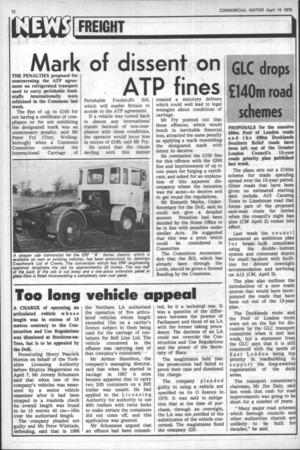Mark of dissent on ATP fines
Page 14

If you've noticed an error in this article please click here to report it so we can fix it.
THE PENALTIES proposed for contravening the ATP agreement on refrigerated transport used to carry perishable foodstuffs internationally were criticised in the Conunons last week.
The fine of up to £100 for not having a certificate of compliance or for not exhibiting the designated mark was an unnecessary penalty, said Mr Peter Fry (Tory, Wellingborough) when a Commons Committee considered the International Carriage of Perishable Foodstuffs Bill, which will enable Britain to accede to the ATP agreement.
If a vehicle was turned back in almost any international transit because of non-compliance with these conditions, the operator would incur loss in excess of £100, said Mr Fry.
He noted that the clause dealing with this matter created a statutory defence which could well lead to legal wrangles about conditions of carriage.
Mr Fry pointed out that these offences, which would result in inevitable financial loss, attracted the same penalty as applying a mark resembling the designated mark with intent to deceive.
He contrasted the £100 fine for this offence with the £200 fine and imprisonment of up to two years for forging a certificate, and asked for an explanation of this apparent discrepancy where the intention was the same—to deceive and to get round the regulations.
Mr Kenneth Marks, UnderSecretary for the DoE, said he could not give a detailed answer. Penalties had been decided by the Home Office to be in line with penalties under similar Acts. He suggested that this was a point which could be considered in Committee.
The Committee recommended that the Bill, which has already been through the Lords, should be given a Second Reading by the Commons.




























































































